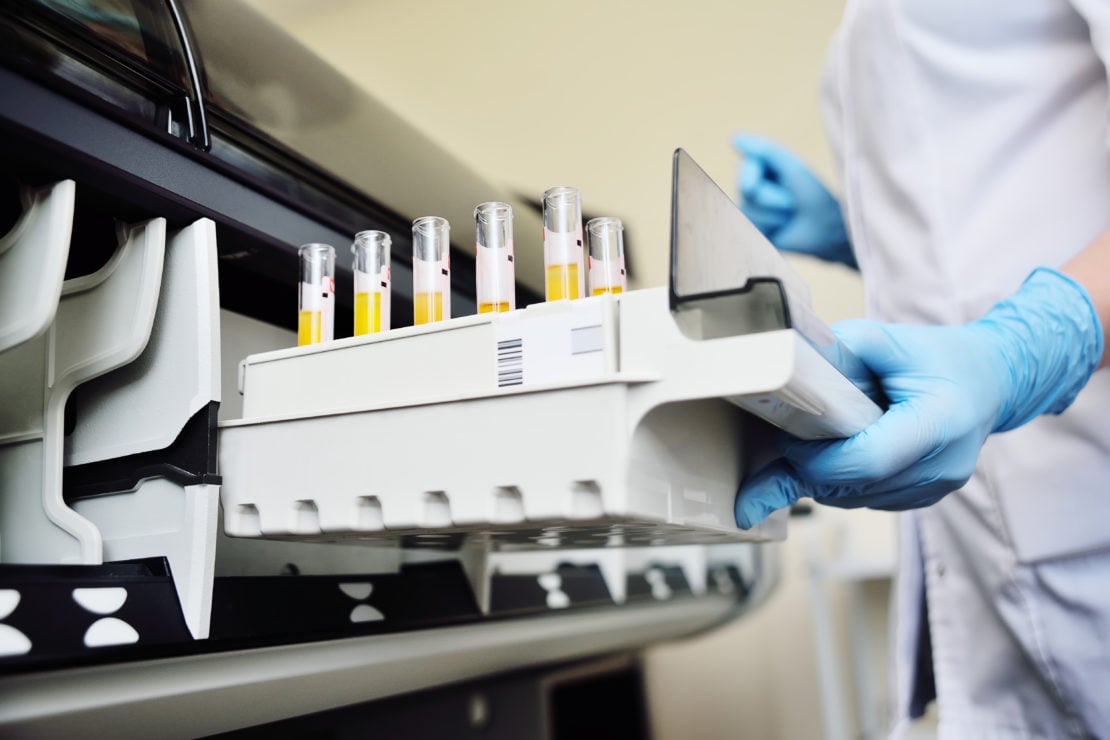
Concept to clinic - challenges facing medical diagnostics start-ups and how to overcome them
June 2024
by the Healthcare & Life Sciences team at 42T
Medical device and diagnostics start-ups are at the forefront of innovation. They drive progress in healthcare and transform patient care, but their journey is not without its challenges. From regulatory hurdles to reimbursement, every obstacle tests their resilience and creativity.
New medical diagnostics can transform the way we approach patient care by catching conditions earlier or enabling more effective or personalised treatment.
%20(1).webp?width=753&height=503&name=shutterstock_1450296923%20(2)%20(1).webp)
But the promise of innovation comes with a host of challenges that demand clarity, resilience, and ingenuity. From navigating the maze of regulations to carving out a niche in a crowded market, start-ups in the sector face hurdles that test their resolve and creativity.
In this article, we examine the ecosystem of diagnostics companies and discuss the various obstacles this dynamic industry faces, as well as the strategies that empower new ventures to thrive.
Building a strong team
Building a strong team is critical for the success of diagnostics companies. However, attracting and retaining skilled professionals, including scientists, researchers, and regulatory experts, can be challenging in this particularly competitive industry.
To attract top talent, diagnostics companies should create an attractive work environment and consider benefits such as flexible working arrangements, professional development opportunities, and equity ownership. Companies should also emphasise their mission and values to attract candidates who are passionate about making a difference in healthcare.
%20(1).webp?width=730&height=411&name=shutterstock_2290631777%20(1)%20(1).webp)
However, the areas you need to work on initially will be numerous and you may not realistically be able to support a team of employees with all the skills you need. External partners, used correctly, can offer focused support that enables you to keep to your roadmap.
Forward looking technology development
Developing accurate and reliable diagnostic tests requires significant investment and a strategic approach to research and product development. You need to invest in cutting-edge technologies, ensure their scalability, and continuously innovate to stay ahead of competitors.
You have your own core expertise, but there will be other areas you will need some support with, preferably from people with experience who will stop you making expensive bad choices early on. Some early advice and review on aspects such as volume manufacture, automated assembly, usability or sterilisation, can help ensure the design is on track to becoming a viable product at scale.
Consider collaborating with industry partners, academic institutions and research organisations to access specialised expertise and resources. Collaborative R&D partnerships can accelerate the product development process by providing access to state-of-the-art facilities and equipment. Or by developing other aspects of the product in parallel while your internal team focuses on the core technology.
%20(1).webp?width=1126&height=634&name=shutterstock_1515843710%20(3)%20(1).webp)
Safeguarding innovations
Protecting intellectual property (IP) is vital for diagnostics companies to shield their innovations and maintain a competitive edge. Medical device start-ups must take proactive steps to safeguard their IP through patents, trademarks, and other forms of protection. Patent attorneys or IP consultants can help companies to develop an IP strategy tailored to their specific needs and objectives.
Before filing for patents, new ventures should conduct thorough prior art searches to assess the novelty and patentability of their innovations. This involves reviewing existing patents, scientific literature, and market reports to identify any similar technologies or inventions. Once freedom to operate (FTO) has been established for the core technology, knowing how to write a strong patent, how to identify white space in a crowded landscape, and how to evolve your patent applications throughout the journey to publication is crucial.
In addition to patents, consider other forms of IP protection, such as trademarks, copyrights, and trade secrets. Trademarks can protect the company's brand identity; copyrights can protect creative works, such as software code or marketing materials. Trade secrets, such as proprietary algorithms or manufacturing processes, can be protected through confidentiality agreements and internal security measures.
Mastering the regulatory maze
Establishing a medical start-up isn't just about groundbreaking technology development; it's also about navigating the web of regulations that govern the industry. The medical diagnostics field is extremely well controlled, with regulatory bodies such as the FDA in the US and the MHRA in the UK ensuring that only safe and accurate tests make it to market.
To navigate this complex terrain, diagnostics companies must begin by understanding the regulatory requirements and pathways that apply to their products. This is not always straightforward for groundbreaking new technologies. Engaging with regulatory consultants specialising in the medical diagnostics field can provide valuable guidance and support in defining a regulatory strategy and compiling submissions.
Evidence that you are following a suitable QMS is a key requirement in many cases. You don’t need to go overboard from the start but need to be sure when you do reach the appropriate point, what you’ve done so far won’t need repeating.
Reimbursement and pricing
Securing reimbursement and establishing favourable pricing agreements are both essential steps toward ensuring the viability of a new venture. The complex reimbursement landscape and cost considerations pose challenges in establishing a profitable business model.
Just as thorough examination and analysis guide treatment decisions, investing in healthcare economics data and conducting market research inform pricing strategies, aligning them with market demand and ensuring the sustainability of diagnostics companies.
Invest in accurate healthcare economics data early. It could stop you launching at the wrong price point and may show you a more valuable end-user use-case.
Building relationships with key stakeholders, including insurance providers and healthcare systems, can shed light on their preferences, facilitate negotiations and streamline the reimbursement process.
Demonstrating efficacy and accuracy
Validating the efficacy and accuracy of diagnostic tests in clinical settings is crucial for gaining regulatory approval and for persuading KOLs and buyers of the benefits of your technology. Conducting clinical trials and obtaining clinical data can be resource-intensive and time-consuming, so it is important to have a strategy.

By clarifying the intended use and target performance characteristics of their tests, companies can ensure that the validation process aligns with regulatory requirements and market expectations. This may involve conducting preclinical studies, analytical validation, and clinical trials in accordance with established protocols and guidelines.
Even after regulatory approval, medical start-ups must often demonstrate the clinical utility and cost-effectiveness of their tests to healthcare providers to drive widespread adoption and integration into clinical workflows. To address this challenge, diagnostics companies should collaborate with key opinion leaders and clinical researchers. A common strategy is to run larger research studies after the device has been approved by regulators, when studies are easier to set up.
Standing out in a crowded market
In a highly competitive industry, differentiation is key for medical diagnostic start-ups seeking to gain market share and build brand recognition. Competing with established players and other emerging ventures requires a strategic approach to positioning and branding. Start-ups must effectively communicate their unique value proposition and establish trust with healthcare providers and patients.
New ventures should focus on building a strong brand identity and implementing targeted marketing strategies. This may involve highlighting key differentiators, such as technological innovations, clinical performance, or a patient-centric approach. Take care to understand the regulations that apply and ensure that any claims can be supported by evidence.
Consider different marketing channels to engage with different audiences – for example conferences, media, digital marketing channels or patient support groups and influencers.
Ensuring data privacy and security
Handling sensitive patient data comes with significant responsibility. Ensuring the privacy and security of patient information is critical to comply with regulations and gain the trust of patients and healthcare providers.
Medical start-ups must ensure data privacy and security using robust data privacy measures that shield sensitive patient data from unauthorised access and breaches. Be aware of applicable regulations such as the UK’s General Data Protection Regulation (GDPR), the EU GDPR, and the US Health Insurance Portability and Accountability Act (HIPAA). Failure to adequately protect patient data can result in reputational damage and legal liabilities.
.webp?width=1920&height=1282&name=pexels-mikhail-nilov-8730785%20(1).webp)
Start-ups should develop data management policies and procedures to govern the collection, storage, and use of patient data. Robust data privacy and security measures must be established from the outset.
This may include encryption protocols, access controls, and regular security audits to identify and mitigate potential vulnerabilities. By implementing proactive measures to safeguard data privacy and security, new companies can build trust with patients and healthcare providers and mitigate the risk of data breaches.
Overcoming resistance to change
Convincing healthcare providers to adopt new diagnostic tests and integrate them into their workflows can be challenging. Physicians may be hesitant to change established practices or may require extensive clinical evidence to support the adoption of new tests. Medical start-ups must effectively communicate the clinical benefits and value proposition of their tests to overcome resistance to change.
Diagnostics companies can achieve this by engaging with key opinion leaders (KOLs) and thought leaders in the medical community. KOLs can advocate for the adoption of new technology development, build credibility and gain support for new tests. Collaborating with KOLs early also means they can provide valuable insights into market needs and preferences, and advise on where best to pitch your service within the patient pathway.
Adapting to changing market dynamics
Economic factors and market forces can impact the success of medical diagnostics start-ups. Changes in healthcare policies, reimbursement rates, and market demand can influence business strategy and profitability.
.webp?width=1280&height=720&name=pexels-artempodrez-5716016%20(1).webp)
Diagnostics companies should continuously monitor market trends and anticipate potential changes in regulatory and reimbursement landscapes. Maintaining open communication channels with stakeholders and developing contingency plans can help mitigate risks associated with market fluctuations.
Start-ups are often in a position where they can prioritise flexibility and innovation in their business models to adapt to changing market dynamics. This may involve exploring new market opportunities, expanding product offerings, or entering into strategic alliances with complementary businesses.
Navigating the path to success
Medical device and diagnostics start-ups are at the forefront of innovation. They drive progress in healthcare and transform patient care, but their journey is not without its challenges.
From regulatory hurdles to reimbursement, each obstacle tests the resilience and creativity of these pioneering companies. That said, diagnostics companies and medical start-ups continue to rise, guided by a commitment to innovation and a vision for a healthier future.
As start-ups in the medical and diagnostics field continue to navigate the intricate landscape of healthcare innovation, experienced partners can offer invaluable support in overcoming challenges and minimising lost time.
At 42T, we specialise in solving complex technical problems through innovative solutions that seamlessly integrate design, science, and engineering. If you're ready to take your medical start-up to the next level, contact us today to explore how we can help you succeed.
Read a selection of our case studies and insights here. Subscribe to our healthcare newsletter.

If you would like to find out more, please contact Craig:
craig.townsend@42T.com | +44 (0)1480 309461 | LinkedIn: Craig
Share this article:
Related Articles

Healthcare & Life Sciences
The future of home healthcare: trends and innovation

Healthcare & Life Sciences
Right to repair: reshaping the medical equipment industry

Healthcare & Life Sciences
The hidden risks with smart injectors - is high-tech sacrificing usability?

What will you ask us today?
We believe in asking the right questions to drive innovation; when we know the right questions, we generate the ideas to answer them.

